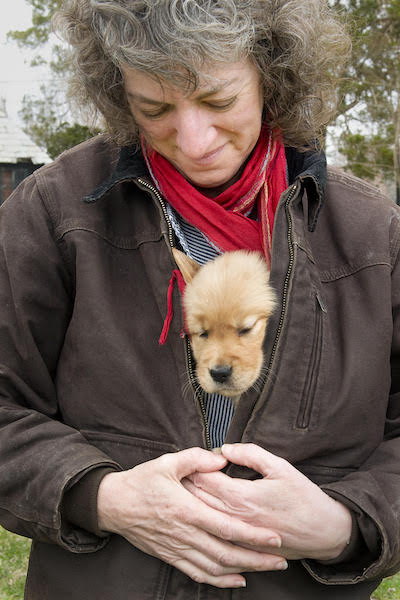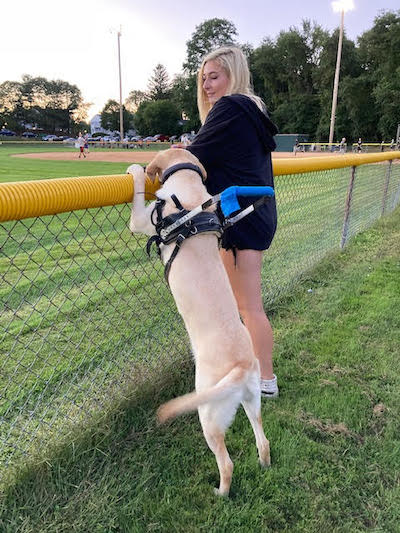Here at ECAD, having high training standards is incredibly important for fulfilling our mission. We pride ourselves on maintaining training and service standards that exceed accreditation standards. Maintaining excellence guarantees that our dogs live happy and fulfilling lives of service. Further, it ensures that our dogs can provide for their clients and their needs.
In order to fulfill our mission and maintain high standards, we need dedicated staff who share a commitment to excellence. After all, in order to train Service Dogs of the highest quality, our trainers need to be top-notch as well. Unlike non-accredited training organizations, our commitment to excellence allows us to consistently place dogs with clients and maintain relative stability. This allows us to secure steady employment for our trainers and focus on doing what we do best.
We’re happy to showcase our Service Dog Trainers! Their dedication and expertise is invaluable to ECAD and our Service Dogs. Whether you’re a client, volunteer, or animal-lover, these wonderful people deserve the utmost praise. Learn how you can get involved with ECAD and make a difference!
 Lu Picard
Lu Picard
- What made you want to become a Service Dog training professional? Training dogs began as a hobby that grew out of my love for babies. Puppies and babies are very similar to me, full of love and giggles. In the summer of 1994, my dad had a stroke that limited his ability to rise from the couch and prevented him from walking independently. This was very upsetting to me and I felt I had to do something to help my dad. Since I had been training my own dogs I decided to teach one of my dogs to help my dad get up from the couch and support him when he attempted to walk. Once I saw how those two simple commands helped my dad, I knew I should be training dogs to assist other people as a career. No one in Connecticut was doing it, so I did.
- What is the most rewarding aspect of your work? All of it. Being with newborn puppies and watching them learn and thrive. Seeing a 9-month-old dog feel so excited when they finally open and hold a door. I especially love it when a client and a trained dog take a big step toward independence together. Most times this big step is one that we might often take for granted. For example, I have such clear memories of when a young girl we worked with was so excited to be able to use a public bathroom with only the help of her dog.
- What is one thing that the general public probably doesn't fully appreciate about ECAD's approach to Service Dog training? I think the public does not understand how much out-of-the-box thinking a trainer needs to employ to be effective. While a typical dog might be taught to sit in your house, a Service Dog will need to be able to sit inside, outside, on the grass, pavement, snow, and in any other conditions. It is the same thing for a dog that retrieves: that dog needs to retrieve everywhere, anytime, no matter what is around them, and be able to retrieve a variety of items. I love the challenge!
See if you’re eligible for a service dog via our Open Doors program!
 Marissa Crowley
Marissa Crowley
- What made you want to become a Service Dog training professional? I started working at ECAD in the kennel. About 3 weeks into my journey at ECAD we had a Team Training, working with a group of clients and pairing them with their Service Dogs. I saw how the clients gained so much independence and happiness at the end of those two weeks and I knew that was something that I wanted to be a part of.
- What is the most rewarding aspect of your work? I love seeing a client be matched with their Service Dog. We had a veteran come to team training in a wheelchair: two months later he came back to visit ECAD and he was walking again. The dog gave him the motivation to get out of his wheelchair and gave him more strength and confidence through their companionship. I love witnessing this transformation.
- What is one thing that the general public probably doesn't fully appreciate about ECAD's approach to Service Dog training? People might not appreciate how many hands are involved in training: our puppy raisers, the home for the weekend team, countless volunteers, and our team of trainers. In the two years that a Service Dog is in training with us, there are so many people that help mold them into becoming the best most well-rounded Service Dog for the person they are destined to go to.
Are you a veteran or know a veteran who needs assistance? Learn more about Project Heal!
Jessica Fitzgerald
- What made you want to become a Service Dog training professional? I have loved animals my whole entire life. I first heard about the concept of a Service Dog at the age of 16, and I fell in love with the idea of an animal helping others. I always thought dogs were such wonderful creatures and to see an animal change someone's life for the better truly inspired me. Growing up, I always knew I wanted to be a teacher. I knew I wanted to help others learn and grow. But I didn't necessarily know that this is what I would be "teaching!" I like to think I am a dog "teacher". I influence, guide, and teach these dogs to use the best of their abilities to help others, and I absolutely love it.
- What is the most rewarding aspect of your work? There are a lot of rewarding aspects to this job, but I think the most is seeing our clients with smiles on their faces. Most of our clients have had rough lives, and society doesn't make it any easier. These Service Dogs give them a sense of independence, confidence, and a love that is undeniable. It makes the work that I do all worth it. When I can see someone who struggled throughout life get a little weight off their shoulders with our Service Dogs, it brings joy to my heart.
- What is one thing that the general public probably doesn't fully appreciate about ECAD's approach to Service Dog training? I think the general public doesn't fully understand how serious we take training these dogs. Yes, these dogs are cute and look cuddly and sweet, but they are working dogs. The dogs are there for people who need help, and any distraction could be fatal. Obviously, we teach our dogs to deal with such distractions, but I think if the public could just understand why we take what we do so seriously, it could be a lot easier on the dogs and the clients.
Learn more about Canine Magic: our program that helps children with autism!
Jeanne Jones
- What made you want to be a Service Dog professional? I have worked with ECAD as a volunteer since 2011 and have become more and more involved with the organization over time. First, I started out taking dogs home for the weekend. Then I studied under the head trainer to pass the ADI Public Access test so I could take dogs-in-training out into public. For many years I spent time helping to train ECAD Service Dogs as a volunteer, either in the training center or out into public. I also took on the volunteer job as the person who tests our graduate service dog teams for their Public Access Licenses. In addition, I organized an outreach program for ECAD in the local public schools to do demonstrations with our dogs to entice children to sign up for our summer camp program. That morphed into a general outreach program in libraries, senior centers, and other community groups. Our goal was to increase the visibility of the work we do training dogs to assist disabled people to gain independence. When a position became available to train the juvenile dogs, I decided to join the staff.
- What is the most rewarding aspect of your work? I love seeing the end result of a fully trained Service Dog being paired with a client to support. Since I do the Public Access testing, I get an intimate view of how well the team has come together to graduate from our program. Every team is different, and each dog and person has a different, heartwarming story about how they came together to this powerful bonded relationship.
- What is one thing that the general public doesn’t fully appreciate about ECAD’s approach to Service Dog training? Having conducted many public outreach programs, I know from the questions asked and the amazed looks on the audience’s faces that most people have no idea how much we can teach our dogs to do. People gasp when I ask my dog to pick up my keys or dropped coins or my credit card from the floor. They are surprised that we can train our dogs to open the refrigerator, get something and bring it to their client. Or to pull the clothes out of a washer and put them into a dryer. And our dogs do these tasks joyfully with their tails wagging, happy to help! Only by seeing these skills, can the public begin to understand just how much independence an ECAD dog can give to a handicapped person.
As you can see, our service dog trainers come from varying backgrounds and take great pride in their work. Through their commitment to their work cultivating high-quality service dogs, they make ECAD a leader in teaching service dogs the skills they need to serve our clients. Learn how you can support ECAD and make a difference!
